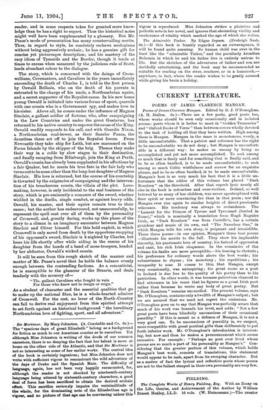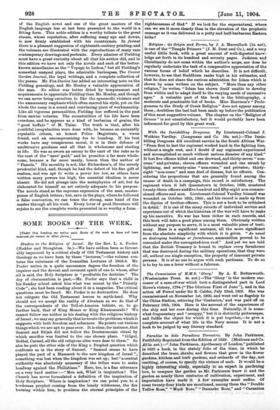FIELDING.
The Complete Works of Henry Fielding, Esg. With an Essay on the Life. Genius, and Achievement of the Author by William Ernest Heiley, LL.D. 16 vols. (W. Heinemann.)—The creator of the English novel and one of the great masters of the English language has at last been presented to the world in a fitting form. This noble edition is a worthy tribute to the great classic, whose reputation, after suffering many ups and downs, is now firmly established with his countrymen. In format there is a pleasant suggestion of eighteenth-century printing, and the volumes are illustrated with the reproductions of many rare contemporary drawings and portraits. Every admirer of Fielding must have a great curiosity about all that his author did, and in this edition we have not only the novels and such of the better- known miscellanies as the "Voyage to Lisbon," but all Fielding's somewhat unequal plays, the admirable burlesques, The Covent Garden Journal, the legal writings, and a complete collection of the poems. Mr. Fox-Davies has added an interesting note on the Fielding genealogy, and Mr. Henley a valuable appreciation of the man. No editor was better fitted by temperament and acquirements to appreciate Fielding than Mr. Henley, and though we can never bring ourselves to like the spasmodic violence and the unnecessary emphasis which often marred his style, yet on the whole the essay is a sound and convincing piece of workmanship. Like all vigorous personalities, Fielding has suffered in the past from unwise votaries. The eccentricities of his life have been overdone, and he appears as a kind of barbarian of genius, the " good buffalo" of M. Taine. The truth is that, after his youthful irregularities were done with, he became an eminently reputable citizen, an honest Police itagistrate, a warm friend, and an uncompromising foe to humbug. If his best works have any conspicuous moral, it is in their defence of unobtrusive goodness and all that is wholesome and sterling in life. He was as sworn an enemy to the cant of the rake as to the cant of the " unco' guid," and he preaches a far more whole- some, because a far more manly, lesson than the author of "Pamela." His morality is not, like Richardson's, of the merely prudential kind, and, though he had the defect of his fine gift of realism, and was apt to write a power too low, as others have written many powers too high, the essential idealism is never absent. He did not plunge into the metaphysics of art, but he elaborated for himself an art entirely adequate to his purpose. The novels stand as the supreme expression of the man, master- pieces of English letters ; but, save in the plays, where he followed
false convention, we can trace the strong, sane hand of the master through all his work. Every lover of good literature will rejoice to see the complete works presented in so worthy.a form.
•











































 Previous page
Previous page